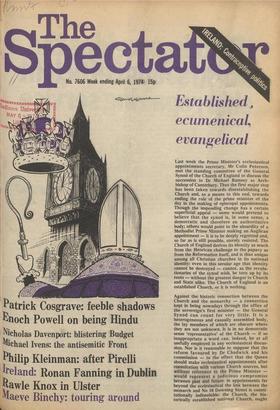Established , ecumenical, evangelical
Last week the Prime Minister's ecclesiastical appointments secretary, Mr Colin Peterson, met the standing committee of the General Synod of the Church of England to discuss the succession to Dr Michael Ramsey as Archbishop of Canterbury. Thus the first major step has been taken towards disestablishing the Church and, as a means to this end, towards ending the role of the prime minister of the day in the making of episcopal appointments. Though the impending change has a certain superficial appeal — some would pretend to believe that the synod is, in some sense, a democratic and therefore an authoritative body; others would point to the absurdity of a Methodist Prime Minister making an Anglican appointment — it is to be deeply regretted and, so far as is still possible, sternly resisted. The Church of England derives its identity as much from the Henrican challenge to the papacy as from the Reformation itself, and is thus unique among all Christian churches in its national identity: even in this secular age that identity cannot be destroyed — cannot, as the revolutionaries of the synod wish, be torn up by its roots — without the greatest danger to Church and State alike. The Church of England is an established Church, or it is nothing.
Against the historic connection between the Church and the monarchy — a connection kept in being nowadays through the office of the sovereign's first minister — the General Synod can count for very little. It is a heterogeneous and casually assembled body, the lay members of which are obscure where they are not unknown. It is in no democratic sense 'representative' of the Church — if so inappropriate a word can, indeed, be at all usefully employed in any ecclesiastical discussion. Nor is it reasonable to suppose that the reform favoured by Dr Chadwick and his commission — to the effect that the Queen should make ecclesiastical appointments after consultation with various Church sources, but without reference to the Prime Minister — would represent a judicious compromise between past and future: in appointments far beyond the ecclesiastical the link between the monarch and No 10 Downing Street is constitutionally indissoluble: the Church, the historically established natinnal Church, ought not to be separated from these well-tried Procedures.
However, for the moment it is clear that Mr Wilson, though leaning towards the radical view of the General Synod, and sympathising With it, intends to have a major say in the appointment of Dr Ramsey's successor. During his consultations he should bear in mind two Characteristics which ought to distinguish the established Church of the future. Though established and national it ought also to be ecumenical, not in the sense of seeking to dissolve its character in the welter of other Christian churches, but in the sense favoured by the late Dr Fisher, in the sense of holding out a friendly hand towards other Churches and co-operating with them where co-operation is beneficial to Christianity as a Whole. And the Church of the future ought to be evangelical, again not in the strict but in the general sense of the word. It ought, that is, to be missionary. Far too much of the original sense of mission has departed from the Church of England in recent years, as too many clerics — and, in particular, too many bishops — have striven desperately to adapt Christianity to What they conceive of as the modern world, rather than the other way round. The Church of the future, then, cannot escape its historical Identity without destroying itself: it ought therefore to remain established. But establishment alone is not enough to ensure survival: the historic sense of Christ must be re-created, and Anglicanism must go forth in a positive Spirit towards the other churches. Without any one of these three elements the decline of the Church of England, so marked under Dr Ramsey, will continue and accelerate.



























